1929 Buhl Sport Airsedan
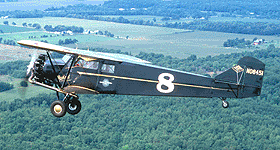
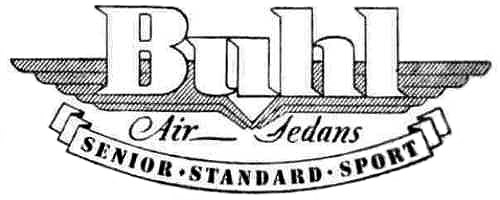
THE FASCINATING STORY OF A 1929 BUHL
SPORT AIRSEDAN MODEL CA-3D/E, NC-8451
AND ADDITIONAL INFORMATION ABOUT THE
BUHL AIRCRAFT COMPANY
1929 Buhl Sport Airsedan


THE FASCINATING STORY OF A 1929 BUHL
SPORT AIRSEDAN MODEL CA-3D/E, NC-8451
AND ADDITIONAL INFORMATION ABOUT THE
BUHL AIRCRAFT COMPANY
WHAT EXACTLY HAS NC-8451 BEEN UP TO THE LAST SIXTY YEARS?
While nearly all U.S. registration records for NC-8451 have been destroyed, the Argentineans have saved the day. From their records, related to the sale by Packard to the first Argentinean owner, we know that Buhl Sport Airsedan NC-8451 was manufactured in November, 1929, in Marysville, Michigan. During the next six months, until its purchase by Packard, we must assume it was owned by the Buhl Aircraft Company. This is not surprising, given the onset of the Depression which was starting to take a bite out of the sales of just about everything, but then came Packard!
According to the "Minutes of the Meeting of the Board of Directors of the
Packard Motor Car Company, held at the factory office, East Grand Boulevard and
Belt Line Railroad, Detroit, Michigan, on Wednesday, May 28, 1930, at 3:00 pm,
the following expenditures are authorized, One (1) Buhl four-place
Cabin Sequi Plane Model CA-3, Number NC-8451, Amount $8,566.67."
Packard purchased the Buhl as a demonstration platform for the new Packard
diesel aircraft engines. Given the airplanes' dashing good looks and enviable
performance characteristics, it was featured in a large number of Packard
advertisements promoting the engine. One full page factory ad "slick"
prominently features NC-8451 under the headline "9/10 of a Cent Per
Mile---actual operating cost of a Packard-Diesel powered on flight of 12,000
miles." It seems most appropriate that, given the rapidly deteriorating
economy of the times, the ad speaks directly to the growing importance of the
economy of the craft. In the margin, the ad slick notes its scheduled appearance
in the March, 1931 issues of Aero Digest, Airway Age, Aviation, Southern
Aviation, Western Flying, Aviation Engineering and the April, 1931 issue of
Popular Aviation.
By the time these advertisements had appeared,
the Depression was gaining considerable strength and Packard was finding new
engine sales harder and harder to come by. On February 27, 1931, the Packard
Motor Car Company sold NC-8451 to Aeroposta Argentina and a Certificate of
Airworthiness for Export, was promptly issued. Aeroposta Argentina had Air
France convert the aircraft back to a Wright Whirlwind from the Packard Diesel.
In 1934, a very notable individual was given a sightseeing ride over Buenos
Aires. While attending the International Eucaristically Congress, Cardinal
Monsignor Pacelli went for a spin over the town. Soon to be elected Pope Pius
the XXII, Monsignor Pacelli became the first Pope to have flown in an airplane.
In 1943, NC-8451, then known in Argentina as
LB-NVE, was sold once more. The engine was subsequently removed for service.
Without its engine, the aircraft was damaged when it was overturned in a strong
wind. It never flew in Argentina again. In 1987, the Argentinean owner's son
began a sales effort by mail to various parties in the United States. It was
ultimately purchased and brought back to the United States in late 1989.
Unfortunately, the purchaser passed away before any restoration could be
attempted and the dwindling remains of NC-8451 languished, piled up in a heap,
in a dusty corner of a California hangar. While talking with a vintage parts
dealer, we learned of the plane's existence. As it turns out, so little useful
material was left of the project it was about to be hauled away to the dump. We
purchased the project in the nick of time and restoration work began in late
1995. The result is the plane you see today.
A BRIEF HISTORY OF THE BUHL
AIRCRAFT COMPANY
The Buhl Aircraft Company was founded in 1925 as part of the holdings of Detroit's Buhl family. By the late 1920s, the Buhl family had been on the Detroit manufacturing scene for nearly one hundred years, best known for the Buhl Stamping Company and the beautiful art-deco Buhl building in downtown Detroit.
Sadly, in the latter half of this century, there has
not been much attention paid to the Buhl Aircraft Company and to the fine craft
which they produced. This was despite the fact that Buhl manufactured the first
aircraft to receive an Approved Type Certificate. A.T.C. #1 was awarded to Buhl
for the fabulous Buhl-Verville J4 Airster in March of 1927. Part of
Detroit's Buhl family holdings, Buhl aircraft went on to win a number of speed
and endurance records and placed among the very top in events such as the Ford
Reliability Tour, the National Air Races and other competitive gatherings.
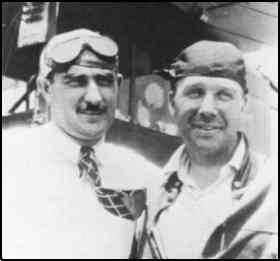
On July 12, 1929, California endurance flyers Loren W. Mendell and Pete Reinhart boosted the Cleveland mark to 246 hours. Flying a biplane, the Angeleno, had beaten the record by more than 70 hours. A large crowd, conspicuous only by the absence of their estranged wives, turned out to see the landing at Culver City. Mendell's wife was suing for divorce.
What followed was a large banquet at the Biltmore Hotel with some 300
guests attending. Local Army and Navy brass were on hand along with the news
media. Even cowboy philosopher Will Rogers made an appearance. As a reward for a
job well done, the Buhl company gave them a new Airsedan biplane. The Wright
engine people chipped in $1,000 and they also signed on for a number of
Vaudeville stage performances.
Photo and text from Russell Plehinger's, "MARATHON FLYERS"
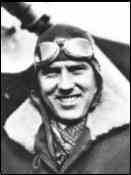
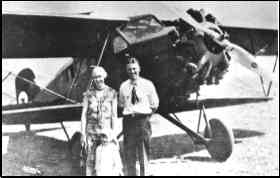
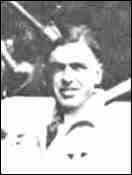
|
Nick B. Mamer |
Nick Mamer with wife and daughter |
Arthur E. Walker |
Photo and Text From Russell Plehinger's MARATHON FLYERS
Another interesting story was the 1929 flight of a Buhl CA-6, known as the Spokane Sun-God. In August of 1929, with Nick B. Mamer as pilot, and Art Walker as mechanic and refueling hoseman, the Sun-God made a non-stop flight from Spokane, Washington to New York City and back again without landing. This was the first transcontinental round trip flight ever taken without landing -- quite an accomplishment for 1929! The 115-hour flight was accomplished with eleven in-flight refuelings, one of which was conducted at 10,000 feet over Wyoming.
Models which Buhl produced include the Buhl-Verville Airster, which was designed by Alfred Verville. When Verville sold his interest back to the company in 1927, Etienne Dormoy took over as chief designer and began the "Airsedan" series which includes Airsedan Models CA-5, CA-5A, Sport Sedan CA-3, CA-3C, CA-3D, CA-3E, Senior Airsedan CA-8, CA-8A, CA-8B, Standard Airsedan CA-6, CA-6B, CA-6W. There were also CA-1, CA-1A, CA-1W, CA-1WA, all of which are thought to be variations on the fantastic low wing Sport Airster which was only prototyped. In an effort to keep the company going during the Depression, the Buhl Pup was then designed, but like so many manufacturers, the market just wasn't there and the Buhl Aircraft Company ceased operations in February of 1933.
Click HERE for a detailed info PDF file on this aircraft